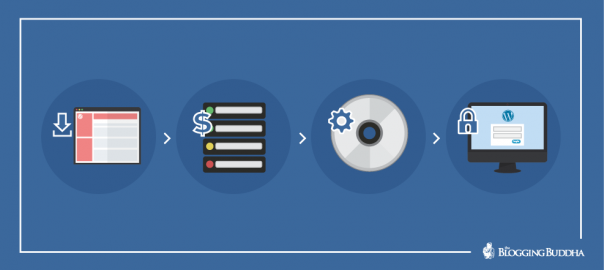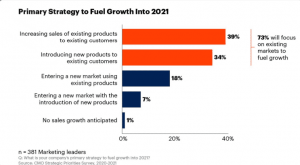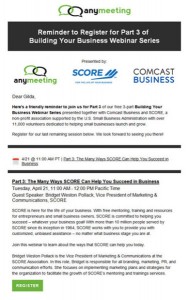Starting a blog is a great way to showcase your talent and interests, while learning about a topic you’re passionate about.
Whether people are tired of you continuously talking about something they don’t understand, or you just want to write about a subject that excites you, a blog is the perfect way to do that.
However, it’s not enough to throw a lot of content on a page and call it a blog. If you’re serious about becoming a successful blogger, there are a few things you need to understand.
Here are 5 important parts of creating content you’ll need to know before you start a blog.
1. Set Goals
You may have identified the niche you’ll be writing for, but you still need to have a clear understanding of what your goals are for your blog. Without quantitative and achievable goals, you won’t accomplish anything. When thinking about your blogging goals, remember to keep the following in mind:
- Set goals with measurable quantities
- The deadlines to your goals
- Consider the possibility that you won’t achieve every goal
- Think positively and try not to consider failure as an option
Understanding what you want to accomplish from your blog, will make sure you’re starting off on the right foot.
If you have multiple objectives, prioritize them, and work to achieve them in that order. Then, you should select your metrics and benchmarking data, to determine a format of tracking your performance.
This will help you monitor your progress, and see which aspects of your blog work and which ones don’t.
2. Self-Hosting Is Best Hosting
If you’re interested in a blog that will eventually bring an income in, you should use a self-hosted platform.
Even though you’ll have to buy a domain name and pay a web-hosting company, it’ll be worth the investment once you start making money from your blog.
Web-hosting companies make the process simple with easy installations and setups.

Some other expenses you’ll need to factor for include; themes and design, testing, and social media marketing or advertising.
If the cost is a barrier, there are a number of free themes and plugins available.
Also, you can achieve success on social media platforms through creativity and hard work, without spending a dime.
3. Google Analytics Is Key
The free tool provided by Google can be your best friend if you use it correctly.
Google Analytics helps with new blog topic ideas and lets you see if a subject you’ve already written about is worth revisiting.
Google Analytics will also give you the data you need to see where your visitors are from, the amount of time they spend on your blog, and the platforms they read it on.
It’s very easy to install Google Analytics, and when used correctly it can do wonders for your blog.

Besides the benefits of being free, Google Analytics can tell you how your visitors are finding you. This helps to identify the keywords you should be focusing on, which can optimize your organic rankings.
The tool also shows which pages and links are clicked on most frequently, so you know how to format future sections.
4. Keep Your Quality Consistent
When you start a blog it’s important that your posts are relevant and filled with quality content.
If you’ve made a commitment to writing a new post every week, each of those posts should provide value for your readers. If you’re unable to publish new content on time, don’t rush your follow-up post.
In the case of quality versus quantity, quality always wins. It’s okay if you miss a day, as long as it means you won’t be posting something subpar.
Your readers will be loyal to your writing. They want to know that each post they read will be as engaging and insightful as the last.
Rushing a post in order to make a publishing deadline will only result in a decline of readership.
Do what you can to stay consistent, but make sure it’s something worth reading. If you’re not sure about it, don’t post it.
5. Patience Is Crucial
Think of your favorite blogger and the amount of traction they’ve made online. They didn’t just start writing one day and have hundreds of followers the next.
Each one worked long and hard to get to where they are. It’s important to be patient.
No one who starts a blog is instantly successful. When starting out, take the time to focus on your visitors and the few people finding their way to your blog.
Take a look at the comments, emails, and any social media shares to see how you can improve.
6. Research
If you’ve never written for an online audience before, you should also research the proper way to reach them.
Creating content for an online audience is different than any other form of distribution. It requires a knowledge of keywords, formatting, and grammar that’s more advanced than most beginner writers will possess.
When starting a new project it’s important that you do your research. This includes the topics you’re writing about and other successful blogs in your network.
Learn from another website’s success and use those lessons in your creation process.
To Sum Up
Starting a blog can be a time-consuming and challenging venture.
From researching content ideas to writing and editing your posts, there are a lot of steps that most people don’t consider when beginning to publish. This doesn’t include connecting with other blogs, or sharing your content with social media channels.
The internet has changed how information is distributed and being a part of that communication is rewarding. Just make sure you’re prepared before you begin to ensure your success!
Let me know what you think of this article in the comments below.
Digital & Social Articles on Business 2 Community(81)
Report Post






